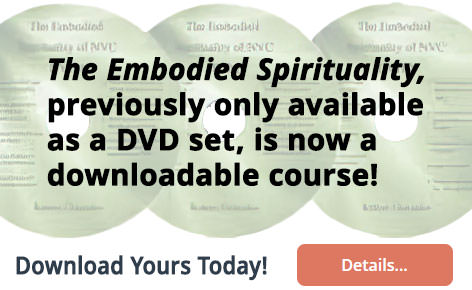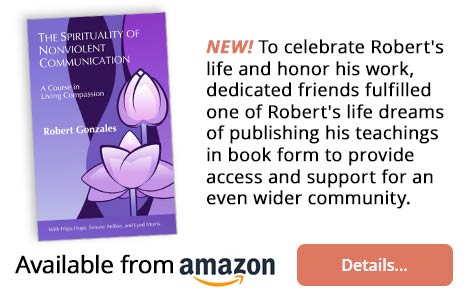

Welcome to the Robert Gonzales Training Legacy. Here you can learn more about Robert and the powerful teachings he dedicated his life to. NVC Academy is proud to house and share with you the complete body of his life's work. We invite you to explore, learn, and help keep his legacy alive!
Robert's passion was in the spirituality of the Nonviolent Communication (NVC) process. He saw NVC both as a process that helps people connect more authentically with themselves and others, and as a spiritual practice and way of living. The worldwide NVC community mourned when Robert died in 2021. He left behind a legacy of work that emerged from a lifetime of inquiry into the intersection between spirituality and human communication. More about Robert.
Article
5-7 minutes
As you witness injustices in the world, tension, anger, hopelessness, despair and more, may rise up in you. These feelings may lead to reactive thinking that doesn't contribute to healing nor wise action. Mourning is a universal need. If your culture pushed away grief and its emotional expression, you may have habits that block your access to the aliveness of grief. Read on for ways to give grief the space and support it needs.
Details...Trainer Tip
1 - 2 minutes
Trainer tip: NVC consciousness recognizes interdependence. In this process each person is autonomous; everyone's needs matter; people have choice and responsibility for their actions; there's abundance, and a valuing of coming together. The dependence / independence paradigm assumes we either need someone else to be whole -- or we don’t need others at all. Commit to living autonomously. Notice where you struggle with this.
Details...Article
3-5 minutes
The ability to identify your needs and take effective action to meet them is one way to define agency. Access to agency is complex and varies widely from person to person. Access to agency depends upon a variety of conditions. For example, if you struggle with agency, shame may tell you that you're broken in some way. If agency comes easily in an area, then you may view others who struggle with it, as lazy or stubborn. Read on for more.
Details...Article
4 - 6 minutes
Read on for a demonstration of self empathy -- all generated within the context of both the COVID-19 pandemic, and the changes to Bridget's life that have arisen as a result.
Details...Audio
8 - 11 hours
Does your inner dialog sound supportive and encouraging - or more like you’re being yelled at by a critical task-master? Gain an understanding of the neuroscience of the left and right hemispheres of the human brain and locate just where this savage inner voice is coming from and how to respond to it with empathy.
Details...Article
3-5 minutes
If it's a tender topic and/or you are looking for a particular level of responsiveness, you can let listeners know what you want back before you share -- or you can ask them for a particular kind of response right after you share. The more you can do this, the more it can create supportive relationships in your life. Read on for ways to ask for a particular kind of responsiveness to meet particular needs.
Details...Article
3-5 minutes
For effective dialogue clarify your needs, boundaries, and requests beforehand. Setting boundaries is telling someone what you're going to do in order to meet or protect needs for yourself or others. Whereas with requests, even if you have preferences, you still hold open curiosity about strategies to collaborate with others in meeting needs. Read on for more.
Details...Article
4-6 minutes
Little negative impacts can become big when left unattended. Watch for things like using a sharp tone, choosing not to share something, going along with something when you don’t really want to, trying to convince your partner, impulsively turning away, shrinking, losing access to parts of yourself, hiding, daydreaming about a different life, and judgmental thoughts. Instead, shift the dynamic: take responsibility, provide empathy, and commit to change.
Details...Article
4 - 6 minutes
The pandemic asks us to examine the way we have always done things. It asks to try something new and notice what happens. This is an opportunity to ask why you have done holidays in a certain way and what needs it met to do it that way. Perhaps it is an opportunity to experiment and see what new things might arise. Read on for questions to ask yourself that might help you process your triggers, "should's", feelings, needs and dilemmas.
Details...Article
37 - 56 minutes
What do we actually mean by “use of force” and what counts as such? Here's a template that will be unpacked in this article: "Use of force is consistent with nonviolence to the extent that we use the least amount of force possible, with the most love possible, aiming at (re)creating conditions for dialogue; that we make the choice using as much nonreactive discernment as possible, with as much support for the choice as possible, and while mourning not seeing another way to respond to a situation in which vital needs are at stake except to use force". Read on for more.
Details...

